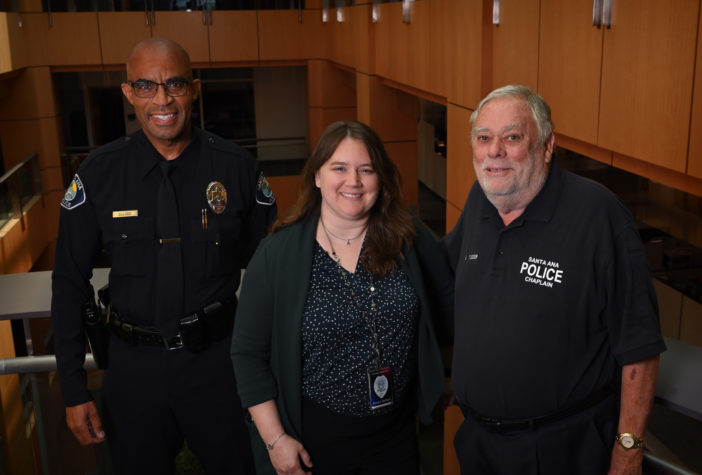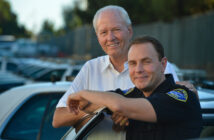A peer support volunteer can be a confidant, an empathetic ally, a resource, or simply a sounding board.
Whatever role they take on, peer support volunteers at the Santa Ana Police Department are there to provide emotional support for any member of the department, sworn or professional, at any time and for any reason.
An officer-involved shooting. A forensic specialist responding to the scene of a horrific crime or accident. A dispatcher on the line with a suicidal caller. A call involving the death of a child.
Any of these scenarios comes with an emotional price.
The California Peer Support Association defines peer support as “a process where a person discusses a personal issue with a non-professional, usually a friend or a co-worker. A person will select a peer support person primarily based upon trust.”

Santa Ana Police Officer Matthew McLeod, left, with department Chaplain Gary Tucker, as they talk about the department’s Peer Support Program.
Photo by Steven Georges/Behind the Badge
Peer support volunteers are there to listen without judgement, not to give advice or solve problems, said Forensic Services Supervisor Jessica Durham, coordinator of SAPD’s peer support program, which has been part of the department for 20 years.
“If that is all you need to kind of help you through it, that’s great,” Durham said. “If you want more resources, we direct you on to the next step and can help you further.”
The very concept of peer support is what motivated Durham to volunteer for the program five years ago.
“In my mind, the entire department is a family,” Durham said. “I really like the idea that when someone needs help, it is there. No matter who you are and where you are in the department, you have someone you can go to and I like being a part of that.”
Peer support volunteers are also available to family members of Santa Ana Police Department employees and retirees.
Gary Tucker is a volunteer and one of 12 chaplains serving the Santa Ana Police Department. Tucker is one of four chaplains who are peer support volunteers.
Beyond connecting for mental health support, individuals impacted by critical incidents may want to connect with their own spirituality, Tucker said.
“I find out what you need,” said Tucker, who has been a chaplain since 2005. “I can help you with that or I can find you help for that, whatever that might be.”

Santa Ana Forensic Supervisor Jessica Durham talks about helping officers through the department’s Peer Support Program.
Photo by Steven Georges/Behind the Badge
Critical incident debriefs for Santa Ana Police Department employees can be suggested or mandatory in the wake of an emotionally charged occurrence, usually within 72 hours, Tucker said, and a peer support trained chaplain is expected to be part of those debriefs.
“You just do what you can and hope it is helpful,” Tucker said.
Peer support volunteers must go through periodic training, which is mainly facilitated through The Counseling Team International, Durham said.
As a homicide investigator with Santa Ana Police Department for 20 years, Detective Matt McLeod has been exposed to more than a few disturbing crime scenes. McLeod has spent 10 of his 21 years with Santa Ana Police Department on the peer support team.
“I see the effect (the job) has on my colleagues, be they sworn or nonsworn,” McLeod said. “And I’ve always made it a promise to myself to act as a conduit to those people in need of assistance. While we are not trained clinicians or therapists in any way, we can still have the responsibility to help those who we see who are in need of help.”

Santa Ana Police Officer Matthew McLeod, left, department Chaplain Gary Tucker, and Santa Ana Forensic Supervisor Jessica Durham as they gather for a Peer Support meeting.
Photo by Steven Georges/Behind the Badge
McLeod said the concept of peer support was instilled in him by his family at an early age.
“As part of my upbringing as a youth and through my teenage years and through my collegiate years and post collegiate years, I’ve always believed in the need for support,” McLeod said. “We are all one and we have to come together as one in good times as well as bad times.”
 Behind the Badge
Behind the Badge



